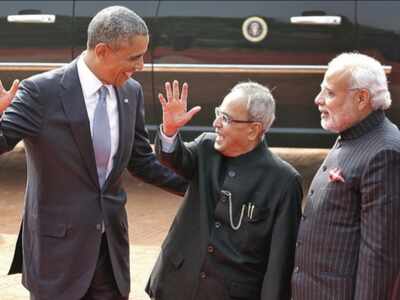
The presidency was the capstone on Pranab Mukherjee’s long political career, but it nearly eluded him for the same reason that he couldn’t become Prime Minister. His widely reported ambition to be PM at Rajiv Gandhi’s expense, after Indira Gandhi’s assassination, had earned him the lifelong distrust of the Gandhi family and its loyalists. Even when he returned to the fold and ably played troubleshooter for the UPA, doubts about his ‘loyalty’ persisted and he was overlooked for the post of home minister in 2004. The same distrust stood in Mukherjee’s way in May 2012, when 10 Janpath — shorthand for the Congress high command — rejected CPM leader Prakash Karat’s pitch to elect him President.
Sonia Gandhi chose Vice President Hamid Ansari instead with an eye on Muslim votes. Mukherjee’s rejection was couched in the claim of his “indispensability” to the government. But he wasn’t taken in by it, nor was he consoled by the offer of the vice presidency, knowing that he could be a consensus candidate drawing support from non-UPA quarters.
Faced with a firm high command, he stuck to the “loyal soldier of the party” playbook, but never discouraged those, including non-Congress politicians, who felt he would make a better President.
Pranab Mukherjee: From Mirati To Rashtrapati Bhavan
He was back in the reckoning when Samajwadi Party, a big factor in the electoral college because of its emphatic win in the UP assembly polls, decided to frustrate Congress’ plan to dent its support among Muslims by sending Ansari to Rashtrapati Bhavan. Mamata Banerjee, who also had significant heft in the electoral college, was not quite enamoured of Mukherjee but she didn’t want to help Congress with Muslim votes either.
Since opposing Ansari would have cost them Muslim votes, Mulayam and Mamata proposed the candidature of another Muslim, former President APJ Abdul Kalam. The choice was anathema to Congress and Sonia because Kalam owed little to Congress for his first ter m and had remained war m towards BJP.
Congress was forced to take a fresh look at Mukherjee’s claim, which became stronger when the Left and DMK refused to support Mulayam and Mamata.
Kalam’s refusal to take the field unless he had the numbers also helped Dada. Mulayam dumped Kalam, triggering speculation about the invisible hand of the “friends of Pranab” club. Mamata also wisely chose not to become an obstacle in the way of a ‘bhadralok’ taking over as First Citizen.
As for the ‘high command’, it was left with the feeling of being outmanoeuvred by someone whose wiles had helped it get the better of opponents.
Sonia Gandhi chose Vice President Hamid Ansari instead with an eye on Muslim votes. Mukherjee’s rejection was couched in the claim of his “indispensability” to the government. But he wasn’t taken in by it, nor was he consoled by the offer of the vice presidency, knowing that he could be a consensus candidate drawing support from non-UPA quarters.
Faced with a firm high command, he stuck to the “loyal soldier of the party” playbook, but never discouraged those, including non-Congress politicians, who felt he would make a better President.
Pranab Mukherjee: From Mirati To Rashtrapati Bhavan
He was back in the reckoning when Samajwadi Party, a big factor in the electoral college because of its emphatic win in the UP assembly polls, decided to frustrate Congress’ plan to dent its support among Muslims by sending Ansari to Rashtrapati Bhavan. Mamata Banerjee, who also had significant heft in the electoral college, was not quite enamoured of Mukherjee but she didn’t want to help Congress with Muslim votes either.
Since opposing Ansari would have cost them Muslim votes, Mulayam and Mamata proposed the candidature of another Muslim, former President APJ Abdul Kalam. The choice was anathema to Congress and Sonia because Kalam owed little to Congress for his first ter m and had remained war m towards BJP.
Congress was forced to take a fresh look at Mukherjee’s claim, which became stronger when the Left and DMK refused to support Mulayam and Mamata.
Kalam’s refusal to take the field unless he had the numbers also helped Dada. Mulayam dumped Kalam, triggering speculation about the invisible hand of the “friends of Pranab” club. Mamata also wisely chose not to become an obstacle in the way of a ‘bhadralok’ taking over as First Citizen.
As for the ‘high command’, it was left with the feeling of being outmanoeuvred by someone whose wiles had helped it get the better of opponents.
Download
The Times of India News App for Latest India News

Coronavirus outbreak
Trending Topics
LATEST VIDEOS
India
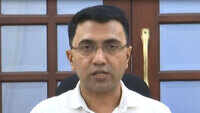 5,500 candidates will appear for JEE, NEET in Goa: CM Pramod Sawant
5,500 candidates will appear for JEE, NEET in Goa: CM Pramod Sawant 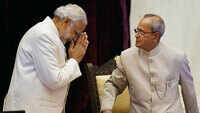 PM Modi mourns former President’s demise
PM Modi mourns former President’s demise 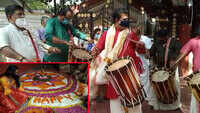 Indore: MP Shankar Lalwani joins South Indian community in celebrating Onam
Indore: MP Shankar Lalwani joins South Indian community in celebrating Onam 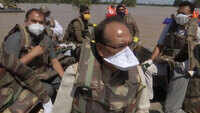 Madhya Pradesh CM Chouhan surveys flood-hit Hoshangabad in boat
Madhya Pradesh CM Chouhan surveys flood-hit Hoshangabad in boat  Family members of militants are soft targets for ISI: J&K Police
Family members of militants are soft targets for ISI: J&K Police 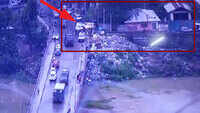 On cam: Terrorists hurl grenade on Army Convoy in Baramulla
On cam: Terrorists hurl grenade on Army Convoy in Baramulla
More from TOI
Navbharat Times
Featured Today in Travel
Quick Links
Coronavirus in MumbaiCoronavirus in KolkataCoronavirus in HyderabadCoronavirus in DelhiCoronavirus in BangaloreCoronavirus symptomsCoronavirus in IndiaWhat is CoronavirusCoronavirus NewsSolar EclipseNPRWhat is NRCCAB BillCAB and NRCRTI BillPodcast newsLok SabhaShiv SenaYSRCPCongressBJP newsUIDAIIndian ArmyISRO newsSupreme Court
Get the app



